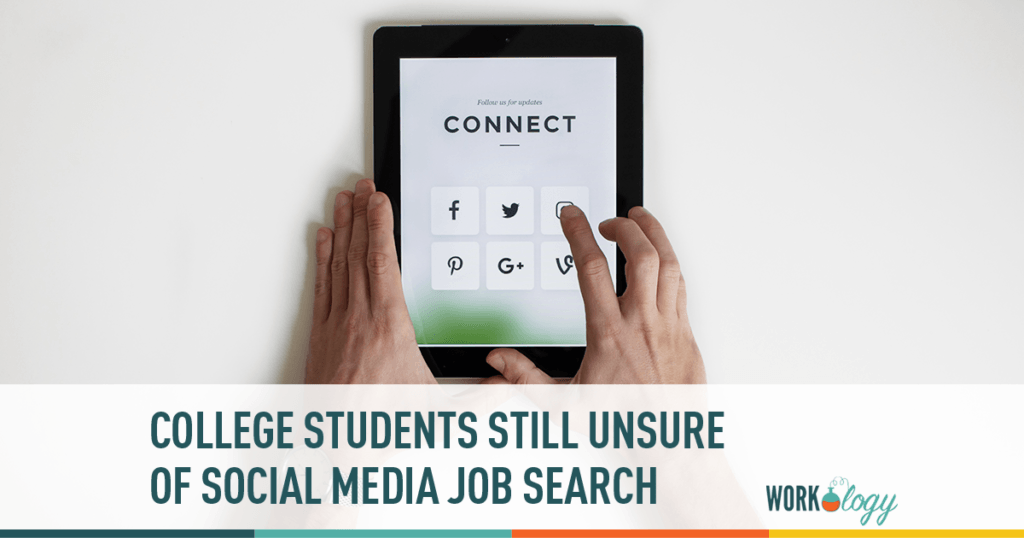When it comes to social media recruitment, much of the reluctance stems from the unknown on the organization’s part – where to start, who “owns” it, what the strategy is, etc… However, once these initial fears and obstacles are conquered, many employers enjoy using social platforms to showcase employer brand, engage their talent community, advertise job openings and source new talent. And those who do it well are reaping the benefits, but the question remains: are job seekers on board?
Many Students Still Unsure of the Social Media Job Search
Just a few weeks ago, during the National Association of Colleges and Employers (NACE) conference, new research on student expectations of the recruitment process and their actual experiences with employers were presented. While many of the results were not surprising, it was interesting to hear open responses on social recruiting and their uncertainty of the social job search. Collectively, most still expressed concerns with privacy, effectiveness and professionalism as primary reasons they don’t want to be contacted by an employer or “Like” and employer on sites like Facebook and Twitter.
NACE’s findings tell us that while young professional job seekers are skeptical of social media, 41 percent of them are using these tools to look for work but 7 perent actually report a company interacting with them on social media. These numbers are on the increase since 2008 and for many corporate recruiting teams still make a compelling argument for social media and their recruitment efforts.
So, what happens when one of your key target audiences speaks out against social media because they feel it’s unprofessional – thus making it an undesirable choice for the job search? Of course, you could incorporate other technology, like mobile career sites, recruitment videos and job boards. But you should already be utilizing a mix of tools in your strategy. The real issue is that this group of soon-to-be and fresh college grads hasn’t yet experienced the professional world and doesn’t understand how to effectively balance their personal and professional lives (referred to by Jason Seiden as being “profersonal”).
What This Means for Your Social Media Hiring Strategy
Obviously, your recruitment strategy should always be well-researched, analyzed and adjusted as needed. But when it comes to internships and entry-level opportunities, just know that your ideal candidates may not be comfortable connecting on networks that are primarily social. This does not mean, however, that you cannot still use Facebook and Twitter to build your employer brand and engage with those who have already begun integrating their professional and personal lives. It’s also a great place to source candidates who you can connect with through other means – like LinkedIn, e-mail or telephone (Google searches can work wonders).
Once on board, it’s also a wise idea to educate entry-level and intern hires on the concept of being “profersonal” and encourage them to utilize their social networks for more than just fun. By doing so, you’re ultimately setting your company up with future employee brand advocates that best represent your organization. These people will also be able to contribute to your employee referral program and are likely to feel like an integral part of your company for years to come.
Autumn McReynolds is the Content Strategist and Lead Blogger for TalentMinded, an online publication focused on talent attraction and engagement in the digital age. After landing in the recruitment space in 2009, she has spent the past three years in the job board industry as both a recruiter and project manager, consulting with clients about job advertisements, employment brand and SEO strategies for attracting new candidates via job postings. You can connect with her on LinkedIn or follow her on Twitter.










2 Comments
If 41% of young professionals are using social media job search tools, but only 7% are getting any response at all from companies, I’m not sure it’s the recent grads that are the ones having a problem adapting to it. With a dismal response rate like that, it’s no wonder Gen Y has concerns about the actual effectiveness of social media in job hunts. Privacy is also a factor; after all, nobody wants their current employer to discover they’re job-hunting because of an errant tweet or Facebook post, and the courts have ruled that companies can fire people for Liking a competitors’ page or even a politician’s page.
From what I can tell, it’s still an issue on both ends. Employers wanting to utilize social need to realize that engagement is key, or they won’t have a community after long. From the job seeker side of things, many more experienced workers no longer see a clear distinction between their personal and professional lives. But for students, privacy isn’t so much a factor from the, “I don’t want my current employer to know I’m looking” angle but more from the, “I still post pictures and updates that I don’t want anyone else to see” side. Many of the open responses in the research expressed that students feel employers are just trying to be “cool” and that it’s awkward to “Like” them on Facebook, which I don’t think is an issue with employees who have been out of school for awhile. Ultimately, it’s up to companies to analyze their target audience to see what works and what doesn’t for particular roles because there are surely fresh grads that are more open to FB and Twitter than others. However, based on this study and a few others I’ve come across, a majority state that they prefer LinkedIn and e-mail for initial contact.
Comments are closed.